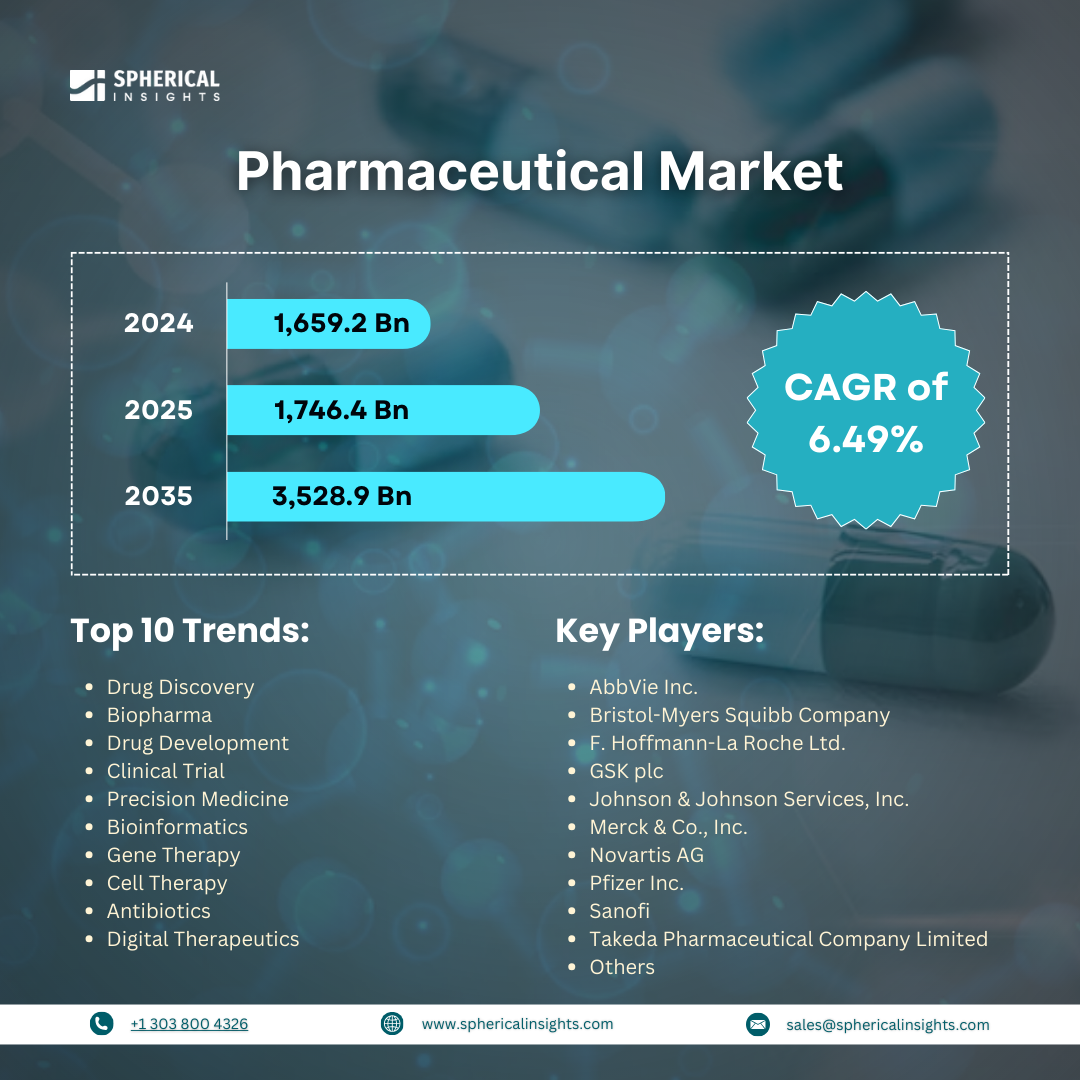Our Market Report:
The Global Pharmaceutical Market Size was Estimated at USD 1,653.7 Billion in 2024 Expected to Grow from USD 1,746.4 Billion in 2025 to USD 3,528.9 Billion by 2035, at a CAGR of 6.49% during the forecast period 2025-2035. Read More
Which breakthroughs will have the biggest impact on the pharmaceutical industry in 2025? Our analysis of 510+ global scaleups and startup firms found important developments in the pharmaceutical sector, specifically in precision medicine, biopharmaceuticals, clinical trials, and drug discovery. Understanding the future course of the industry is made easier with this data-driven approach.
Discover how a technological revolution is changing the pharmaceutical industry in 2025. This revolution is not just about efficiency but also about personalized medicine and drug discovery. The recent shift to digitalization and cutting-edge tools is pushing the industry’s flexibility to streamline processes, improve drug development, and deliver better patient care. Our report analyses the top 10 technological advancements influencing the industry. These trends are fundamentally reshaping the landscape and changing the nature of transportation. We will explore key trends in clinical trials including gene therapy digital therapeutics AI, and ML in clinical trials.
Top 10 Trends of the Pharma Industry in 2025
- Drug Discovery
- Biopharma
- Drug Development
- Clinical Trial
- Precision Medicine
- Bioinformatics
- Gene Therapy
- Cell Therapy
- Antibiotics
- Digital Therapeutics
The Top 10 Pharma Industry Trends and 20 Exciting Startups are highlighted in the Innovation Summary.
The Pharma Industry Innovation Map gives you a thorough picture of the startups and innovation trends that impact your business. In order to conduct this comprehensive study on pharmaceutical industry trends, we examined a sample of 510+ global startups and scaleups. By providing an overview of new technologies in the pharmaceutical business, this data-driven study offers innovation intelligence that enhances strategic decision-making.
The Impact of the Leading Pharmaceutical Industry Trends is Shown by a Tree Map.
The top 10 pharmaceutical trends affecting businesses in 2025 are graphically shown in the Tree Map below, which was created using the Pharma Industry Innovation Summary. Important topics are highlighted, including medication research, clinical trials, and the creation of gene and cell treatments. Additionally, the development of targeted medicines that are adapted to the demands of each patient is being fueled by the increased emphasis on precision medicine. Even though the pharmaceutical sector is seeing technical advancements, supply chain disruptions, and growing R&D expenses necessitate creative approaches. Among the top 10 trends in the pharmaceutical sector are bioinformatics, antibiotics, and digital therapies in medication development. Nevertheless, the pharmaceutical industry's innovation is only partially covered by these patterns. Your top trends can appear differently depending on your particular criteria.
|
Drug Discovery
|
15.3%
|
|
Biopharma
|
9.7%
|
|
Clinical Trial
|
17.5%
|
|
Precision Medicine
|
11.3%
|
|
Cell Therapy
|
12.5%
|
|
Gene Therapy
|
10.9%
|
|
Antibiotics
|
7.4%
|
|
Others
|
15.4%
|
Top 10 Trends in Pharmaceutical Industry In 2025
- Drug Discovery
Drug development progresses by improving molecular structures, lowering toxicity, and improving pharmacokinetics. Quantum computing enables complicated molecular simulations, reducing difficulties such as long manufacturing times and expensive prices while increasing drug development efficiency in the pharmaceutical business. AI accelerates drug target identification and interaction prediction, whereas cryo-EM provides high-resolution imaging for designing tailored medications. NGS assists in genomic analysis for disease-associated genetic variants, whereas HTS evaluates many chemicals concurrently, as shown in antibiotic screening.
Oncology Drug Efficacy Prediction is advanced by SENTINAL4D
Sentinal 4D, a UK-based firm, uses AI and 3D cell biology to predict medication effectiveness for cancer drugs. The platform uses powerful AI-powered algorithms to evaluate chemicals, predict treatment outcomes, and find the most effective medications. Furthermore, the platform predicts the safety and toxicity profiles of cancer medicines in silico and detects probable drug-drug interactions. The study of 3D cell biology provides new insights into medication interactions and cell shape. Sentinal 4D provides tools for predicting therapeutic efficacy and accuracy.
MOLECULE AI provides De Novo Molecular Design.
Molecule GEN is an AI-based drug discovery platform developed by Molecule AI, a Polish firm. The platform analyzes large chemical and biological datasets, finds drug candidates, forecasts molecular interactions, optimizes compound attributes, and expedites the research process by fusing AI algorithms with in-depth pharmaceutical knowledge. Molecule AI uses AI-driven de novo design to automate the production of tiny molecules that resemble drugs for certain targets. Researchers may see proteins, ligands, and their interactions via a single interface and obtain protein information.
- Biopharma
Pharmaceutical companies also use advanced manufacturing technologies for continuous bioprocessing, which reduces production costs and time, resulting in more efficient therapeutic outcomes. Biopharmaceutical advances, such as biologics, gene therapy, and next-generation sequencing (NGS), are driving targeted treatments for cancer and autoimmune disorders. Biologics like Herceptin and Humira target specific antigens, whereas CRISPR-Cas9 gene therapy corrects genetic disorders through precise editing.
Psychiatric Drug Efficacy Prediction is made possible by Itay & Beyond.
Itay & Beyond, an Israel-based startup, is developing a drug discovery platform that uses big data analysis to gain a thorough understanding of biological processes and pathologies. The platform enables the testing, screening, and development of new treatments for neuropsychiatric disorders. It also includes RNA therapeutics and organoid technology, which uses single cells to build 3D living and functional miniature organs for testing. Itay & Beyond uses these advanced technologies to create tools for precision medicine in mental health.
AI-based biologics design is streamlined by SilicoGenesis
SilicoGenesis offers AI-based biologics design through its cloud-based platform, Eve, allowing pharmaceutical and biotech companies to optimize therapeutic molecules. The platform uses AI/ML techniques such as graph neural networks, convolutional neural networks, and diffusion models to predict protein-protein interactions, as well as paratope and epitope prediction. Furthermore, SilicoGenesis offers humanization services to reduce immunogenicity, aligns biologics with human germline sequences, and conducts developability assessments to address aggregation, stability, and post-translational modifications, thereby mitigating downstream risks.
- Drug Development
In drug development, high-throughput screening is critical because it tests thousands of compounds quickly to identify those that interact effectively. AI-powered algorithms analyze massive amounts of biomedical data, identifying potential treatments for diseases such as amyotrophic lateral sclerosis. Molecular modeling enables researchers to develop molecules that target specific mutated proteins in melanoma. These advanced technologies are efficient, accurate, and help reduce time to market, speeding up the entire lead optimization process.
Pherion produces insights on drug targets and populations.
Pherion, a German firm, simulates randomized controlled trials using its AI-enabled platform while evaluating complicated biological data from various populations. Pherion integrates AI with human genetics to provide insights into on-target safety, side effects, and potential treatment prospects. The platform combines deep phenotypic data to health trajectories, bridging disease pathophysiology and clinical outcomes. It profiles targets such as Lipoprotein(a) to help pharmaceutical researchers decrease late-stage trial failures.
KinCon Biolabs develops Mutation-Specific Biosensors
KinCon Biolabs, an Austrian firm, is developing a platform for mutation-specific activity profiling using cell-based biosensor technology, with the goal of developing kinase-targeted therapeutics. This method incorporates patient-specific mutations into biosensors, enabling for highly individualized monitoring of therapeutic effectiveness and specificity. The technology makes it easier to produce full-length biosensors in target cell lines, allowing researchers to learn more about protein activity in living cells. KinCon Biolabs helps to create more precise and effective medication treatments by doing systematic, dose- and time-dependent drug profiling in a high-content format.
- Clinical Trial
Decentralized trials, real-world data (RWD), and AI-powered platforms are revolutionizing clinical trials, making them more efficient and transparent. Blockchain technology helps to keep data private and trustworthy, which is very crucial in decentralized studies. Remote patient monitoring (RPM) and RWD from electronic health records (EHRs) allow studies to involve a larger and more varied set of patients, boosting accuracy. AI systems, which use techniques such as natural language processing (NLP) and predictive analytics, enable data analysis and the identification of viable drug candidates faster. All of these advancements are contributing to clinical studies that are more patient-centered, accurate, and effective.
PhaseV trials enable trial designs that are more adaptable.
PhaseV Trials, a US-based startup, uses machine learning and statistical methods to improve adaptive trial design and execution. The platform combines clinical knowledge with advanced statistical techniques like reinforcement learning and causal ML to optimize trial parameters in real-time. Using a multi-arm bandit approach, promotes exploration-exploitation strategies for treatment options based on ongoing results. PhaseV Trials also employ causal inference to identify hidden signals in clinical data for retrospective analysis. These innovations increase resource and time efficiency, resulting in better clinical trial outcomes and patient care.
BEKhealth makes clinical trial patient matching easier.
BEKhealth, a US-based startup, is developing an AI-powered patient-matching platform to improve clinical trial recruitment. The platform analyzes structured and unstructured data from electronic medical records (EMRs) using natural language processing and deep learning. It also includes a query and cohort builder, which converts unstructured data to queryable formats. The platform accurately identifies protocol-eligible candidates by converting disorganized clinical notes into a synthesized, longitudinal patient graph. Furthermore, BEKhealth offers real-time patient data and automates feasibility analysis, allowing you to make informed decisions quickly.
- Precision Medicine
Precision medicine shifts the pharmaceutical industry toward personalized care, which improves treatment efficacy by accounting for patient variability. Genomic sequencing is important because it reveals genetic variations that influence disease progression and drug response, allowing for the development of personalized treatment plans. Biomarker analysis is used to predict patient responses to therapies, allowing for the development of drugs tailored to individual genetic profiles, as seen in some breast cancer treatments. AI-powered analytics combine vast amounts of clinical data to identify patterns, which aids in drug development and clinical trial optimization. These technologies collaborate to improve the precision of medical treatments, making care more effective and personalized.
InnoSIGN streamlines the detection of aberrant activities in cell signaling pathways.
InnoSIGN, a Netherlands-based startup, creates the OncoSIGNal platform to detect abnormal activity in tumor-driving signaling pathways such ER, AR, PI3K, MAPK, Hedgehog, Notch, and TGFβ. OncoSIGNal objectively assesses mRNA levels of pathways and target genes using an RT-qPCR testing plate, resulting in exact activity scores for these pathways. This method converts gene expression data into a quantitative assessment of cell signaling activity, providing important insights into cancer's molecular underpinnings. OncoSIGNal is available for research use and provides PCR tests, RNA-seq data processing, and service testing for a variety of tumor types. InnoSIGN's technology contributes to precision medicine efforts in cancer treatment by allowing for a better knowledge of tumor biology.
Akiram Therapeutics allows radiotherapeutic-based solid tumor treatment.
Akiram Therapeutics develops molecular radioimmunotherapy for solid tumors that express the CD44v6 protein, providing a personalized treatment option for aggressive cancers. Akiram selectively targets cancer cells while sparing healthy tissues by combining a proprietary antibody and the radioactive isotope Lutetium-177. This approach offers a more precise and effective treatment strategy, which is especially useful for patients who have few options. In addition, 177Lu-AKIR001 is used for diagnostic imaging, personalized dosing, and improving treatment outcomes. Akiram's novel approach is advancing precision medicine in the battle against cancer.
- Bioinformatics
Bioinformatics uses machine learning to identify drug targets, predict interactions, and create therapies that have fewer side effects. Cloud computing enables real-time collaboration by storing massive genomic and proteomic data. High-throughput sequencing generates genetic information quickly, revealing biomarkers and mutations for personalized medicine, particularly in oncology and rare diseases. These advancements accelerate drug discovery, improve clinical trial accuracy, and establish bioinformatics as a key driver in the development of precise, effective treatments.
Amply Discovery offers Digital Biological Biome-Based Drug Discovery.
AMPLY Discovery, an Irish startup, uses an AI-powered platform to connect the digital biological biome with high-volume peptide, protein, and RNAi extraction technologies. It uses a proprietary in silico and in vitro hybrid platform to mine large amounts of biological data and identify best-in-class molecules for drug discovery. The platform identifies and extracts promising compounds using advanced algorithms to analyze biological data. AMPLY Discovery offers solutions to improve the efficiency of discovering new drugs.
Praexisio provides Next-generation Sequencing-based Personalized Drug Design.
Praexisio, a Taiwanese startup, creates tailored medication design methodologies using next-generation sequencing (NGS), cMAP, AI support, and protein molecular dynamics simulations. Praexisio's Safe Bestead technology analyzes illness genes using artificial intelligence-driven molecular docking (MD) to dock potential medication candidates onto target proteins. The platform combines data from X-ray crystallography and MD simulations to detect alternate conformations of target proteins and compare medication candidates to many possible states. Praexisio provides effective treatment options through extensive screening.
- Gene Therapy
CRISPR-Cas9 corrects mutations by targeting specific DNA sequences, allowing researchers to create therapeutics for illnesses such as sickle cell anemia and cystic fibrosis. Adeno-associated viruses (AAVs) can efficiently transport therapeutic genes, as observed in treatments for inherited retinal disorders. NGS accelerates mutation detection and gene therapy development, resulting in better patient outcomes. These technologies stimulate pharmaceutical innovation by allowing for the exact repair of complicated genetic abnormalities while also decreasing drug development time and costs. They also aid in treating previously untreatable disorders.
Nanocell Therapeutics produces non-viral DNA-based in vivo gene therapy.
NanoCell Therapeutics creates non-viral, DNA-based gene treatments for cancer and autoimmune disorders. To improve gene integration, the platform combines DNA/RNA-transposase technology with improved lipid nanoparticles (t-LNPs). These nanoparticles combine DNA and RNA to target certain cells. Nanocell's technology also contains binder technology and minicircle DNA for T-cell activation, allowing it to cure a variety of illnesses while maintaining T-cell proliferation for long-term disease protection.
Beacon Therapeutics enables ocular gene therapy.
Beacon Therapeutics, based in the United States, is developing ocular gene therapies for genetic eye disorders such as X-linked retinitis pigmentosa (XLRP), cone-rod dystrophy (CRD), and dry age-related macular degeneration (dAMD). The startup uses its proprietary platform to identify secreted proteins in ophthalmology. Beacon's late-stage XLRP candidate uses an adeno-associated viral (AAV) vector to deliver a corrective gene, restoring photoreceptor function and slowing disease progression while addressing the genetic causes of retinal diseases.
- Cell Therapy
Cell therapy improves cancer and autoimmune treatments, such as CAR-T cell engineering and advanced manufacturing. CAR-T therapy alters T cells to target drug-resistant cancers such as acute lymphoblastic leukemia. Advances in automated bioreactor systems and real-time analytics have streamlined cell therapy production, increased scalability and lowering costs. These technologies improve treatment efficacy and accessibility, broadening options for conditions with few therapies. As the pharmaceutical industry adopts these innovations, it moves closer to providing curative treatments and transforming disease management.
Cellares offers a cGMP cell therapy manufacturing platform.
Cellares, a US-based firm, provides an Integrated Development and Manufacturing Organization (IDMO) that uses Industry 4.0 to mass-manufacture life-saving cell therapies via the cGMP cell therapy QC platform. It creates fully automated, high-throughput production systems based on the Cell Shuttle platform. Cellares provides a comprehensive software suite that supports the majority of cell treatment techniques. By deploying Cell Shuttles in smart factories around the world, the firm serves the global need for cell therapies. Cellares make life-saving treatments more accessible on a worldwide basis.
Cellistic developed an iPSC-based cell therapy platform.
Cellistic is a top provider of iPSC-based cell therapy development and production solutions. Cellistic, with its expertise in human induced pluripotent stem cell (iPSC) technology, provides a comprehensive platform to help new cell therapy developers. This platform includes essential components of the cell therapy development pipeline, such as iPSC reprogramming, cell differentiation, and robust manufacturing methods. Cellistic enables its partners to accelerate the translation of innovative cell therapies from concept to clinic, giving life-changing medicines to patients in need.
- Antibiotics
Genomic sequencing has revealed new bacterial targets, such as teixobactin, which combats resistant strains by targeting lipid II in bacterial cell walls. AI speeds antibiotic development, as demonstrated by Halicin, which destroys multidrug-resistant microorganisms. CRISPR-Cas9 develops next-generation antibiotics by targeting resistance genes in microorganisms such as drug-resistant Staphylococcus aureus. Machine learning anticipates bacterial evolution, which aids in the development of long-term antibiotics. High-throughput screening looks for new antibiotics in huge compound libraries, such as those that inhibit resistant Mycobacterium tuberculosis.
MetalloBio creates antimicrobial agents with its Inorganic Chemistry Platform.
MetalloBio is a pioneering company that creates innovative antimicrobial agents using a novel Inorganic Chemistry Platform. This approach takes advantage of the unique properties of metal complexes to develop a new class of antibiotics with distinct mechanisms of action, addressing the critical issue of antimicrobial resistance. By investigating the vast potential of inorganic chemistry, MetalloBio hopes to develop potent and effective antimicrobials capable of combating a wide range of bacterial infections, including those caused by drug-resistant pathogens.
Andira Pharmaceuticals develops a Triple Synergy Silver-Based Antibiotic.
Andira Pharmaceuticals is working on a new family of antimicrobials using a "Triple Synergy" method with silver. Recognizing the critical need to tackle the growing problem of antibiotic resistance, Andira blends silver's intrinsic antibacterial capabilities with synergistic processes to develop a new generation of robust and effective antimicrobials. This novel method seeks to overcome the constraints of conventional antibiotics by increasing efficacy, widening the spectrum of activity, and lowering the risk of resistance development, ultimately tackling the urgent global health crisis of antimicrobial resistance.
- Digital Therapeutics
DTx platforms use big data and AI to provide individualized cognitive behavioral therapy, which improves patient adherence and outcomes in disorder treatments. Wearable gadgets used in digital diabetes management programs continuously monitor patient vital signs, allowing for real-time modifications to treatment plans and lowering dependency on medication. Furthermore, cloud computing securely saves and analyzes large amounts of patient data, allowing for seamless integration across numerous devices and platforms. These technologies address the issues of patient noncompliance, high treatment costs, and the demand for personalized care by providing scalable, effective alternatives to conventional therapy.
Vitad.io develops an AI-powered lifestyle modification app.
Vitad.io is using artificial intelligence (AI) to transform healthcare by developing a personalized lifestyle modification app. This unique platform uses AI algorithms to assess personal health data, activities, and goals. Based on this thorough study, the app offers users individualized recommendations and advice for improving their health and well-being. Vitad.io's AI-powered solution enables people to take an active role in managing their health by encouraging positive lifestyle choices that can help avoid or manage chronic diseases.
Emocog makes devices for treating mild cognitive impairment.
Emocog, a South Korean startup, uses advanced digital treatments and software, including medical device (SaMD) technologies, to improve cognition in patients with moderate cognitive impairment (MCI) and early-stage dementia. Emocog creates Cogterra, a digital therapeutic device that utilizes software-based cognitive training regimens and diagnostic tools. Emocog uses artificial intelligence (AI) and data analytics to provide non-invasive solutions for cognitive decline. Emocog enables patients to better control their diseases while also advancing the field of digital treatments in neurology.
Conclusion
The pharmaceutical sector is undergoing a substantial shift, fueled by technological advances. This paper examines ten significant market trends for 2025, focusing on drug discovery, biopharmaceuticals, clinical trials, and precision medicine. Artificial intelligence, big data, and gene editing are transforming the way pharmaceuticals are created, evaluated, and provided to patients. These breakthroughs hold the possibility of more tailored therapies, higher efficacy, and lower prices. The emphasis on bioinformatics, next-generation sequencing, and digital therapies speeds the route to a future of more accurate and effective healthcare. As these trends evolve, the pharmaceutical industry has the opportunity to make important contributions to improving global health outcomes.



